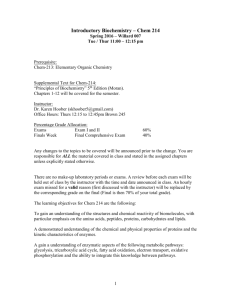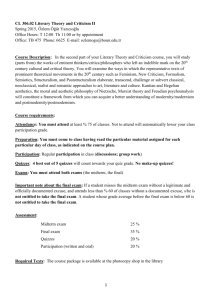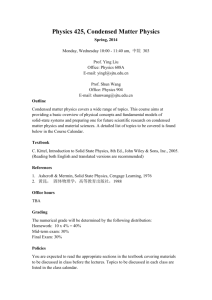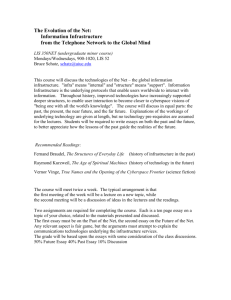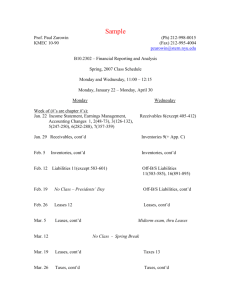课程大纲模板
advertisement
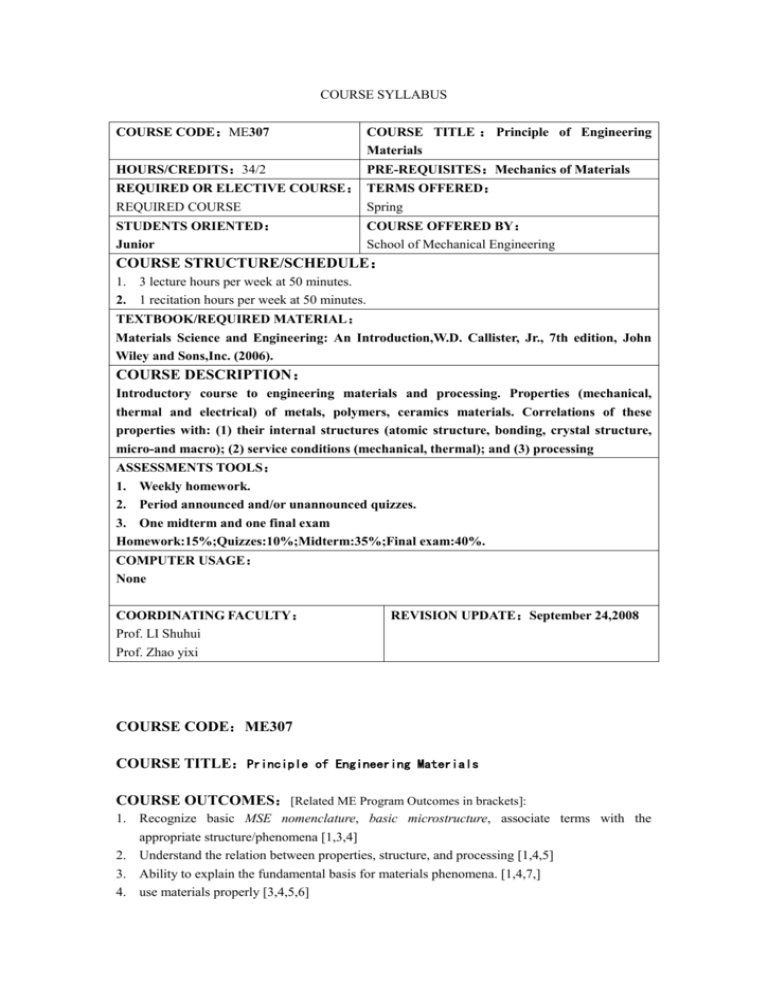
COURSE SYLLABUS COURSE CODE:ME307 COURSE TITLE : Principle of Engineering Materials HOURS/CREDITS:34/2 PRE-REQUISITES:Mechanics of Materials REQUIRED OR ELECTIVE COURSE: TERMS OFFERED: REQUIRED COURSE Spring STUDENTS ORIENTED: Junior COURSE OFFERED BY: School of Mechanical Engineering COURSE STRUCTURE/SCHEDULE: 1. 3 lecture hours per week at 50 minutes. 2. 1 recitation hours per week at 50 minutes. TEXTBOOK/REQUIRED MATERIAL: Materials Science and Engineering: An Introduction,W.D. Callister, Jr., 7th edition, John Wiley and Sons,Inc. (2006). COURSE DESCRIPTION: Introductory course to engineering materials and processing. Properties (mechanical, thermal and electrical) of metals, polymers, ceramics materials. Correlations of these properties with: (1) their internal structures (atomic structure, bonding, crystal structure, micro-and macro); (2) service conditions (mechanical, thermal); and (3) processing ASSESSMENTS TOOLS: 1. Weekly homework. 2. Period announced and/or unannounced quizzes. 3. One midterm and one final exam Homework:15%;Quizzes:10%;Midterm:35%;Final exam:40%. COMPUTER USAGE: None COORDINATING FACULTY: Prof. LI Shuhui Prof. Zhao yixi REVISION UPDATE:September 24,2008 COURSE CODE:ME307 COURSE TITLE:Principle of Engineering Materials COURSE OUTCOMES:[Related ME Program Outcomes in brackets]: 1. Recognize basic MSE nomenclature, basic microstructure, associate terms with the appropriate structure/phenomena [1,3,4] 2. Understand the relation between properties, structure, and processing [1,4,5] 3. Ability to explain the fundamental basis for materials phenomena. [1,4,7,] 4. use materials properly [3,4,5,6] 5. Describe a processing sequence to produce materials with specific microstructures and/or properties. [4,5,6,9] 6. Recognize new design opportunities offered by materials selection. [2,6,8,9] RELATED ME PROGRAM OUTCOMES: [1] [2] [3] [4] [5] [6] [7] [8] [9] Engineering fundamentals Team work and communication Experimental skills Analytical skills Integ. of analy./prob solv./design skills Open-ended design problem solving skills Communication Ethically responsible in a globally/social/intell./tech. context. Curious and persistent continuous learners COURSE TOPICS & DETAILED SCHEDULE: Week Date Lecture 1 Mar.2 1 2 3 4 5 Mar.5 2 Mar.9 6 Mar.12 7 8 3 Mar.16 9 10 Mar.19 4 Mar.23 11 12 13 14 Mar.26 5 Mar.30 Apr.2 6 Apr.6 15 16 17 18 19 20 21 22 Apr.9 7 Apr.13 Apr.17 8 Apr.20 23 24 25 26 27 28 29 30 Topic Introduction Atomic bonding Structure Directions, & Planes Point defects Dislocations & other defects Diffusion Diffusion, In class problems Mechanical Properties-elastic Mechanical Properties-plastic Plastic Deformation Strengthening & hardening Fracture Fatigue, In class problem Creep Review session Exam #1 Phase Diagrams Phase Diagrams Phase Transformations Phase Transformations Heat treatment Alloys Reading (chapter.se ctions 1 2,19.3 3.1-3.7 3.8-3.15 4.1-4.4 4.5-4.18 5 5 6.1-6.6 6.7-6.12 7.1-7.7 7.8-7.13 8.1-8.6 8.7-8.11 8.12-8.15 Covering chap1-8 9.1-9.10 9.11-9.15 10.1-10.4 10.5-10.8 11.7-11.9 11.1-11.3 Review session Ceramics Polymers-structure Polymers-mechanic properties Composites 12.1-12.8 14.1-14.14 15.1-15.9 16.1-16.7 Apr.24 9 Apr.27 31 Composites, In class problems 32 Review session 33 34 Exam #2 16.8-16.10 Covering chap9-16


